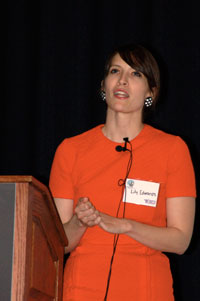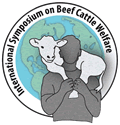Responding to Public Concern
Beef producers need to understand consumers' concerns about animal welfare and learn how to talk to consumers about animal care.
MANHATTAN, Kan. (May 19, 2010) — According to Lily Edwards, assistant professor of animal behavior and welfare at Kansas State University (KSU), the beef industry must face the facts. There is a changing societal ethic regarding animals. More consumers are concerned about the physical and psychological well-being of domestic livestock. More consumers are interested in where and how food animals are produced.

It is becoming obvious at the meatcounter that consumers are becoming more interested in how the meat they buy is produced, Lily Edwards shared.
Speaking during the International Symposium on Beef Cattle Well-Being, hosted by KSU, Edwards said consumers are forming opinions on how animals should be raised, and expressing their preferences at the meat counter. However, those preferences often are influenced by negative images of livestock production. The image of “factory farming”, particularly in pork, poultry and veal production, doesn’t set well with many consumers. As evidence, Edwards cited the successful passage of state ballot initiatives that restrict certain production practices.
“Generally, consumers look more favorably upon cattle producers,” Edwards offered. “But they are questioning practices such as dehorning, castration, branding and confinement feeding.”
Edwards said the beef industry needs to engage consumers and tell its story. Lecturing consumers won’t work. And if producers want to lose an argument with consumers, Edwards suggested these 10 simple steps she credited to Dave Daley at the University of California-Davis:
1) Justify management practices with economics. Animal well-being is secondary.
2) Assume science gives all the answers. Ethics don’t matter.
3) Assume you must defend all production practices; even if they are questionable.
4) Assume all producers are doing the best job possible. There’s always room for improvement.
5) Attack anyone who disagrees with you.
6) Never listen to the opposing argument.
7) Assume the lunatic fringe represents the general public.
8) Be reactive; not proactive.
9) Assume the opposition is stupid, evil or both.
10) Don’t even try to build coalitions with consumers.
In fact, Edwards said, producers should do the opposite of everything on the list. The industry should build bridges of communication with consumers, and seek middle ground.
“We as an industry might have to give some ground to find compromise,” stated Edwards.
The beef cattle welfare symposium was conducted on campus at K-State University May 19-21. For additional presentation summaries, return to the Meetings > Other Industry Meetings > News Coverage page of the API Virtual Library. For more about the symposium and an archive to the 2008 symposium, visit www.isbcw.beefcattleinstitute.org.
Editor's Note: This article was written under contract or by staff of Angus Productions Inc. (API), which claims copyright to this article. It may not be published or distributed without the express permission of API. To request reprint permission and guidelines, contact Shauna Rose Hermel, editor, at 816-383-5270.

